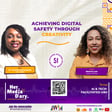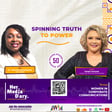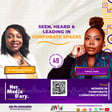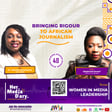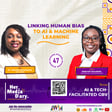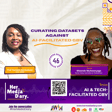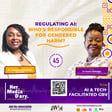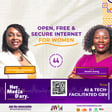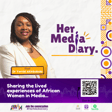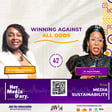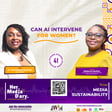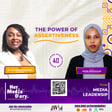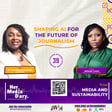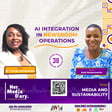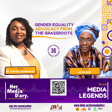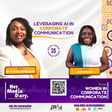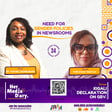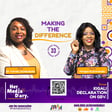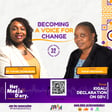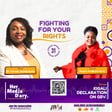Financial Challenges in Sudanese Media
00:00:07
Speaker
media and sudan or being in this sector of sudan is i feel like it's the most hectic job minimal pay while while everyone is also hating you by the way and so while running an entity and just worried about its sustainability it's a real challenge and it's not a position we have enough of like i feel like we still need to keep talking about it and if you're generating income how do you ensure sustainability are you just going to jump from a fund to another ah which of course have risks as well because if you're just chasing funds then you're not responding to the need that you that you see or you're struggling with, but what the opportunity is.
Mission of African Women in Media
00:00:47
Speaker
Imagine a world where we have gender equality and equity in and through media. That is our mission at African Women in Media. I'm Dr. Yemisi Akimobola and this is Her Media Diary, a podcast that captures the lived experiences of African women working in media industries.
00:01:03
Speaker
Now in this episode, I'm joined by Omnia Shokat and Ragdan Osud, two remarkable women who have co-founded media organizations dedicated to serving the Sudanese community.
Female Media Entrepreneurs in Male-Dominated Industry
00:01:16
Speaker
Their journey is not only inspiring, but also highlights the challenges faced by female entrepreneurs in what is predominantly a male-dominated industry.
00:01:27
Speaker
As female co-founders, Omnia and Ragdan reflect on the unique challenges they encounter in media sector. They share their experiences of navigating a male-dominated environment and the importance of networking and supporting other women in the field.
00:01:41
Speaker
Their dedication to empowering future generations of female journalists and media creators is evident in their initiatives aimed at bridging the experience gap. So throughout this series, we'll be in conversation with African women who have redefined media sustainability through their various capacities.
Networking and Support Among Women in Media
00:01:59
Speaker
By inviting these voices into conversation, we hope provide solutions to breaking down barriers faced by African women working in media industries.
00:02:12
Speaker
All right, so Omnia and Ragdan, thank you so much for joining us on the podcast.
00:02:23
Speaker
I think we've had to change the schedule a few times, so thank you so much for making the time. I'm really interested to hear about your journey. Often I like to get to know you know, the background, the growing up, the life before we would become adults of my guests.
00:02:37
Speaker
But you guys are co-founders, you work together. So I wonder, did you guys know each other growing up or was that late in life and situation? No, not growing up, but um I feel lucky enough to know her in my adult life, Amne.
00:02:50
Speaker
Yeah, we crisscrossed over a few wires. um So she's really close friends with Anderia's co-founder. So that's one way I know her. yeah And then we were working for the same organization, but very different programs. But knowing that we're both Sudanese, we connected at some point. But then we became friends and now we got to brunch.
00:03:10
Speaker
Yeah, yeah. would Would you describe it the same way, Ragdan? Yeah, absolutely. happy did see her when we were working at the same organization. i heard about another Sudanese. I'm like definitely connecting and I'm glad I did.
Adapting to Media Challenges in Sudan
00:03:24
Speaker
Great. So did you, where did you guys grow up? I feel like grew up in many different places. I was born in Sudan. You know, since I was seven, we've been jumping around from one country to another, Sudan is still home. Yeah.
00:03:38
Speaker
regardless of where we were, we kept going back for holidays. So I would identify that's the place I grew up. think Yeah. Yeah. omnna Same. Um, I left Sudan when I was three, I returned, i was 24, um, lived in a bunch of different places with my family. And then when I grew up a little, started working on my own.
00:03:57
Speaker
Um, but then I returned back for eight years and only left when the war started. I think it was, I don't know if it was it was becoming home, but it it definitely was the launch pad. Um, And I definitely could see myself living there for a lot longer. I got to know Sudan through these eight years of living there in in adulthood. I used to go for holidays, like Raghdan said, but I was not as connected.
Career Transitions into Media
00:04:18
Speaker
But eventually I did. yeah Do you have much memory of it, Raghdan? Because you lived there for the first seven years of your life. So what do you remember about back then? I feel like all my Sudan memories, more often than not, overshadows every other memory. i yeah yeah i like When I think back to my childhood, this mostly the memories I remember are from Sudan.
00:04:41
Speaker
I do remember beautiful outdoor spaces, and especially when it rains and everyone around it. ah I think those were most the most beautiful nights I've had there. yeah what was What's your fondest memory of growing up in Sudan those years?
00:04:55
Speaker
ah um You're always in a community, I think. We are never alone. I feel like the minute we left Sudan, we were, you know, just me, my parents and siblings. In Sudan, that's not the case.
00:05:06
Speaker
You all... um you have people not just one person around and I think I really enjoyed that right you learn different things from different people so yeah for me that was quite the experience I think no no I think I mean I think it seems the three of us have some kind of shared history in that sense because I left Nigeria when I was very young as well um and you know like you said you you kind of go from being amongst massive families, some of them are not even blood family, to being quite isolated yeah and kind of just you and your siblings and your parents kind of situation, you know. Omne, you left quite young, but you returned often. So what was that like?
00:05:44
Speaker
Yeah, I still had a ah really good time. I was i think I was three or four when I left. And at that point, so my parents, um as Raghdan said, were huge families. My parents had two different families, two different tribes. So that was a really nice environment.
00:05:57
Speaker
but they chose to kind of just do their own little household from the get-go. So I grew up with an amazing nanny. I went to school. I love school from the get-go. My sister is younger, so I had the preschool, and I wanted it to drag her with me, and she wanted to just sleep in, but she wanted to be around.
Media Sustainability and Storytelling Amid Conflict
00:06:14
Speaker
lot of memories of like this young family. We also lived in Darfur for a little bit. My dad worked there, so I remember like sitting in the yard and This being such a desert, ah but I loved it. And then going back, I just remember sleepovers, meeting family, family friends. um And even where I lived, there was always a really solid community that my parents belonged to.
00:06:38
Speaker
It wasn't anything crazy. It was just, you know, a couple of discussions and debates and forums, a discussions. international days here and there, social clubs, philanthropy clubs. So we were always connected even in diaspora, but going back always, it meant a lot about family to me as well.
00:06:56
Speaker
Absolutely. So staying with you, Omnia, you've got a background in the environmental sector. So you've got a master's in environment and resource management, right? So I'm i'm curious from, I mean, and you have an undergraduate in then biology, yeah right? It's a very different to where you are now in terms of media industry. So talk us through that.
00:07:18
Speaker
you know how How did you find yourself from those sectors into media industry? Yeah, I mean, I started off wanting to be an epidemiologist, wanting to do something around HIV and AIDS. I did that for about two years. And then I met my, who then became my supervisor and a really good friend until today.
00:07:37
Speaker
As in, we run in the mall to like, you know, catch each other and hug. I really love her. yeah So she's a German-Egyptian oceanographer. So she got me an environmental science. I went all in for two years.
00:07:49
Speaker
proceeded to do work in that area, just really loved it, but also started the first magazine, which was the first online magazine about environmental living and lifestyle in Egypt. And that was around 2009.
00:08:01
Speaker
a nine It was something, it was, there was something going there. We used to go on events and create advocacy campaigns and we'd have cleanups and we'd go to Guna and Hurghada and the coast. um But then I did my master's and halfway through my master's, I went to the COP, which is Conference of the Particle.
00:08:17
Speaker
I went to volunteer. I paid out of pocket. might My dad paid for my all my education, actually. But um I paid for that conference, which was in the middle of the year. I went for two weeks. We barely slept. We did a lot of what I loved, the communication, the advocacy, of doing research, communicating with people, trying to get the message across. And then the last two days, you know, dignitaries came, swept everything under the rug and created something whitewash. And I was like, absolutely not where I see myself.
00:08:41
Speaker
I went back. I took even more environmental courses. My dad paid right up. So I had a really good time. I ended up working for about six years in development environment. And then that need to disconnect to people, communities, to be part of that voice, that that crowd, um to influence as well, to be part of saying, like, there's something going on need to pay attention to, or when there is something going on, to have that right information to then...
00:09:09
Speaker
um help people make decisions about things, especially coming from our context. like We are not talking about fancy things. We're talking about people's daily livelihoods, their lived reality decisions that are important.
00:09:22
Speaker
I wanted my career to have that. I didn't want us to just be doing policy, to just look like we're doing something, but in effect, really bow down and let whoever is above us do whatever they want.
00:09:34
Speaker
So I just, I tapped out six years later when I met my co-founder and i was like, this is the person, this is the vision. And we ran with it. And almost 10 years later, here we are. Yeah, yeah. And I can see like in Ragdoll, for example, you've had this background in kind of, um you know, working with National Democratic Institute. And so there's always been that kind of advocacy background. and Some of what Omni is saying resonate with you.
00:10:00
Speaker
Absolutely. First of all, I loved hearing your answer, Omnia. There's a lot that I didn't know about you. It's super exciting. Yeah, my my my career path has been extremely different. I've worked in international development in my entire sector.
00:10:17
Speaker
And most of it has been focused on how to support ah partners in Sudan, right? I have worked across the Middle East and North Africa, but a lot of, like the closest to my heart, obviously, was the with the work that we did in Sudan.
00:10:30
Speaker
ah I spent around like six years working with ah with the media development. and media um I enjoy is and where we met actually, Omnia and I. Through that work, I just realized ah the gaps and that most, and while with all the good intentions, like there was great work and and resources that were allocat allocated to support countries like Sudan, it I didn't feel like it resulted in a tailored response, in my opinion. we we did train a lot of journalists, but if you don't have the you know the institution where you go back and it supports your growth in the area and kind of absorbs your your new
Building Audience Trust and Addressing Misinformation
00:11:07
Speaker
learned skills, it it just, like it was, you know kept disappearing. So I started focusing more on how Sudan can have a Sudanese entity that represents its need and you know kind of respond to
00:11:22
Speaker
the gaps we have in the country. I was lucky enough. It was just all ideas. I went back after the revolution, mid COVID actually, my co-founders who had shared frustration about, you know, at the time, I don't know if you have been following, but there was a lot of news about Sudan since the revolution, ah mostly positive, but then there was also a lot of it that was not spoke to Sudanese. I feel like we all, media was international covering Sudanese issues in in an international lens with international flavor.
00:11:50
Speaker
it It didn't feel to me at least that it was much of it was localized or targeted to Sudanese. ah There was a lot of information, but again, there was a lack of accurate information.
00:12:01
Speaker
So yeah, together with my co-founders, and from like the idea came from our own struggle about trying to find accurate news. And at the time, three we had three co-founders and we felt like we were connected to like different actors and different stakeholders. So we We were able to get the information if we digged enough, but we were just thinking about like a regular citizen, not having those much connections.
00:12:23
Speaker
How do you get to the information you need to keep up to date with all the
Impact of International Narratives on African Stories
00:12:27
Speaker
movements in Sudan? And that's where the idea of the workforce came from. We created a space where the goal was just to verify what's accurate and what is not, and just to provide that information to Sudanese.
00:12:38
Speaker
by Sudanese yeah absolutely I mean some of what you both said so far reminds me of um Hoden and Leah I don't know if you both knew her or heard of her and so she was a Somali American it American Somalis no Somali Canadian or Canadian I don't know what's always the right the right um um order um but she she she kind of grew up in Somalia but Moved to Canada when she was very young, grew up mostly in Canada, and then returned to Somalia to change narrative about the country. and Unfortunately, in 2019, she was one of the victims and in that bombing in Mogadishu. And she was actually the very first person I ever interviewed for this podcast.
00:13:20
Speaker
The very first episode of this podcast is Hoden Nbeye. And it was recorded a couple of months before that bombing. You know, she was meant to be at our conference in Nairobi. It was it was all very sad, obviously. But coverage of her death made international news. was on BBC, CNN, everywhere.
00:13:36
Speaker
But what really struck me was this kind of... um The Western media was almost... They were presenting her story, this this idea of her going back to Somalia to change narrative, to train journalists, to... you know present this new and perspective of Somalia, they were juxtapositioning that with the fact that she was then killed in Mogadishu in this very violent way and extra.
00:13:57
Speaker
And it was just really interesting how something i was quite heroic and quite beautiful about the work she wanted to do was presented such an ironic way. And so that was actually why it really inspired me in that moment to edit a story and make sure we get the first four episode out within the news cycle, you know, because I just found that really, really frustrating actually that the story was being flipped in that way to serve that narrative. how what What are some of your reflections so that when you think about your experiences and your why's for setting up your media organizations? There's a lot of those. Now I know where heard about her.
00:14:33
Speaker
I was at the Nairobi conference and I think maybe you've made an ode to her, but I do remember seeing her story. I mean, it's something i I don't know if this is something that I can answer right now. um You know, 1.8 months into a war, I don't think any of us is okay, but especially people in media, it's different because there's the personal and then there's the professional. There's the need to continue doing better because the environment is sliding and the weaponization of information. So it's not the same field that I imagine I would be in. I wanted to do storytelling.
00:15:07
Speaker
um And, you know, we wanted it for Sudan to get stronger ties with South Sudan. And then we said, you know, the whole region needs to kind of understand this and we need to understand it a bit more, especially at the height of the revolution. There was that hope that we could do something different with our identity and with our connections. was mostly Arab world um
Media's Role in Conflict Areas
00:15:24
Speaker
kind of face and we wanted to kind of influence that no you can expand further um and there's so much to see there so now we're talking about human rights we're talking about technology facilitated gbv we're talking about gbv itself i think it's not a linear path but i think the commitment to tell stories in people's voices as it said like one of the reasons why we started is we felt that the content created about sudan
00:15:51
Speaker
was not directed towards a Sudanese consumer. And being, you know, Gen, well, not Gen Z, well, me and my partner, um we felt like that there's that whole rise of use of of internet and connectivity was rising. and And there was an opportunity there for connecting with people and networking and all that.
00:16:09
Speaker
having that content go somewhere um and either be liked or not like so it was really an experiment and you know i guess we're doing something right but um we also had to mold ourselves to our environment we could not be victims of war or survivors and not talk about the war and continue doing positive stories so even that started taking different twists at the height of the revolution then at the coup so many different twists and turns but i think the message here
Challenges for Female Co-Founders
00:16:33
Speaker
is just it's not that linear we still Positive storytelling, we still want to have that consciousness um be weaved into our story so that someone gets what we're trying to say, but also gets our message. That's really important to us, to have people understand why we're here, why we're still doing this when it feels impossible sometimes and almost useless all the time.
00:16:53
Speaker
you know So, yeah, I think that's that's been the journey. I've grown a lot. i did I did not know media. I've learned. I had to learn. I think it's a beautiful field to kind of venture into, especially now with everything that's going on into the world. We need more people who are technical. We need people who are sustainability oriented. We need people who are content and formats, people who are going to leverage AI for better content, more truthful content, authentic content, and also people who will fight things that will try to...
00:17:23
Speaker
you know, make the successful of a situation more than it is. And I'll stop here. Now, I guess my next question will be, how do you balance all of that against your financial sustainability objectives as well, right? Ragdana, I think you're going to have to take this one.
00:17:38
Speaker
Oh, the struggle is real. The struggle is real. Yeah, I feel like that's one of the biggest challenges to many ah around the globe, especially in the the global majority.
00:17:50
Speaker
ah But definitely for Sudan, where um I think Omnia and I, beforehand we spoke about this at some point. But um especially in Sudan where media is no longer profitable, people do not pay for content. you know um Most of the, at the time before the war, the newspaper were owned by the government and there was just very little truth to none. ah So no one was buying it anymore. And of course, with the internet and access to all those information, people were less and less inclined to to pay for content. Yeah. Yeah.
00:18:24
Speaker
media in Sudan or being in this sector of Sudan is, I feel like it's the most hectic job, minimum pay. And if you're running an entity, while while everyone is also hating you, by the way. Yes, absolutely.
00:18:40
Speaker
While running an entity and just worried about it sustainability its it's a real challenge and it's not a organization we have enough of. Like, I feel like we still need to keep talking about it. When we started team reports three years ago, I think,
00:18:52
Speaker
just giving coming from the international development sector and being part of that grant making and realizing that a lot of it does not allow ah income making and profit making. So we were supporting these on the ground who are doing amazing work, but ah most of you know the taxpayer amount was not allowed to be consumed in a way that you can generate income.
00:19:10
Speaker
And if you're not generating income, how do you ensure sustainability? Are you just going to jump from a fund to another, ah which of course have its risks as well? Because if you're just chasing funds, then you are not,
00:19:22
Speaker
responding to the need that you that you see or you're struggling with, but what the opportunity is. When we started Beam, there was a a lot of conversations among my co-founders about how we can sustain our independence and just make sure that we are we continue to be the Sudanese media that we want to be.
00:19:38
Speaker
um So before the war, we we came up with a strategy that, yes, we will take funding and we will do grants, but we will have entities in Beam Reports that is able to who you know, generate income. And at the time we we thought about like, we have like, we have a department called Soudalitica, which does a lot of public opinion surveys and research.
00:19:58
Speaker
So we thought we can, you know, mobilize them to do more like, ah like, yeah, like an outsourcing entity where we can do research and that way we can generate income. We were doing well in many ways. ah into a place where, you know, you go and pick which funder you want or which project you want to be part
Evolving Media Landscape in Africa
00:20:15
Speaker
we We were that entitled. Yeah, that sounds like a place of luxury. was for a short second. For a short second, you know, we were there, I feel. Like we were, yeah, we had our plan together, the team together. And then also I feel like Beam Reports, given that it's the first the media entity in Sudan that is dedicated to mentoring the Sinfo, the Sinfo.
00:20:39
Speaker
We were providing a service that no one else was doing. So that was also ah super handy in us being that, you know, ah coming in with Ego into these conversations. But since before, of course, a lot of us and our teams had to flee Sudan, leaving literally everything behind, including equipments they do on the daily.
00:20:59
Speaker
So the question is harder now than ever ah because we have just registered in Nairobi last year and it just feels starting off scratch. i We are chasing ah grant after grant and we're not in place where um I feel like we have the luxury to see how we can, yeah, to choose or how to maintain our sustainability. But it's it's an ongoing worry, I feel like. it you know And of course, I mean, resource and management and just having resources is not just about money, right? about all the human, technology, social, all of those things. Omine Outback.
00:21:34
Speaker
what has been your journey or your reflections about kind of balancing some of things you said earlier on with your financial objectives?
00:21:51
Speaker
Hello, Hermida Diary listeners. So, permit me to introduce you to the Kigali Declaration on the elimination of gender violence in and through the media in Africa by 2034. It was a groundbreaking commitment by the African women in media community, bringing together gender equality representation and respect to everyone in every media organization across Africa. By being a signatory to the declaration, you are committing to the ethos around how media should engage with gender-based violence, but then also in creating enabling environments for women in media and the kinds of violence that they experience in their line of work, all for the greater good and to create safer and more inclusive work environments for everyone.
00:22:35
Speaker
So imagine this media landscape that treats every story with balance and every voice with dignity. Adopting the Kigali Declaration isn't just a commitment. It's a powerful step towards social change.
00:22:48
Speaker
And that starts with all of us.
Vision for Future of Sudanese Media
00:22:50
Speaker
If you're ready and part of this change, visit the official Kigali Declaration website at africanwomenandmedia.com slash declaration to learn more and to sign
00:23:05
Speaker
Yeah, I mean, I think, um again, our journey has been so interesting, which is kind of part the reason why I love what I do. There's this element of surprise and adventure that just keeps the blood flowing. And you do that otherwise, as I mentioned, this is not a nice job. It's tough. Exactly. i was going to say that that blood flowing thing is it' it' it's very real. And sometimes it's not always so.
00:23:31
Speaker
so odd its No, no, absolutely not. But it plays off. um We have an equilibrium in place. and i in So our journey is is very interesting. So we went kind of, we started with this sort of idea and we kind of went hard on it. um My co-founder and I, a couple of friends, a couple of writers, a couple of photographers, designers. Before we closed one year, we had our first client who basically paid us what we paid for a whole year in one contract.
00:24:00
Speaker
And that's when we opened our eyes and we're like, we need to run this as a business. So that's what we did. I quit my job. had a job at the time. Thankfully, my partner was staying enough to not. So I
Building Sustainable Media Business Models
00:24:11
Speaker
quit my job and I started doing this full time, basically generating revenues through contracts. So these were not grants.
00:24:18
Speaker
At the time, we didn't know what grants were. I think at that point, we didn't know that grants can go to media. We were completely unplugged. And I would say, Even until the the war, and Daria was very unplugged from the local funding or international development funding that was going to media.
00:24:33
Speaker
We did not fit their criteria. We weren't talking about social issues. We weren't talking about human rights. We weren't doing anything that fit their cup of tea at the time. so For you know five years, we went hard on expanding our capabilities. So as Raghdan mentioned, building different services that we can offer to different partners.
00:24:49
Speaker
Some of them were contracts. We started getting grants to do creative projects, to do content, to even sustain like core things by bringing in people and running longer contracts. So I think that's really important to have a team that you can quickly start a project with or run multiple projects at the same time with.
00:25:06
Speaker
you know We figured that somehow we've got to do projections, we've got to do financial planning. All of these things we learned and then our full-time finance person joined in September 2020. see He's been with us ever since. I would say before that we were doing our best, but ever since then we've been really more professional.
00:25:23
Speaker
So again, running this as a business, a business needs to be sustainable. It needs to actually have growth potential. It needs to always look into the market where it can expand, where it can have opportunities. We did this by tapping into a regional sort of landscape. So where our grants are now local for Sudan, but also regional for the for the region. We'd like to expand that even further.
00:25:41
Speaker
um So thinking about their diverse portfolio, thinking about an HR that could potentially muscle a couple of projects at the same time. So building your internal capacity to not just survive from project to project, but but to think like, I want to just run. and i want to continue running.
00:25:55
Speaker
having your own creative projects is important because that's when you get to flex. That's when you get to share results because we do research so we can't share clients' research. So have to build our own research database. um Also doing our own thing, doing something that we like to just keep being invested and motivated. ah But I feel like this is also something really important. You can't,
00:26:14
Speaker
Think about the current situation of media in Sudan or or in the region without thinking of who's running it. If the people running it are running it to run a business because it's a business, then it's going to run like a business for the business. But it may be swayed by this trend or the other. That's a you know business making trend like extreme advertising, clickbait.
00:26:32
Speaker
things like that. These are very scalable media projects, but then who's running them? What is the motivation? What's the intention? All of that. So there's also like that added layer of not only do we need to run this as a functional business that's profitable, has growth potential, you know, state HR component, but we need to run this also putting our conscience in play, right? We have to have values. We need to pick who we work with, whether it's donors, whether it's partners. We need to understand our landscape. We need to understand our audience because for us, they've been with us for 10 years. This is loyalty.
00:27:03
Speaker
I keep telling my most most valuable thing we ever have right now is people's trust in us. We need to grow and evolve, but very slowly and bringing them and explaining why are we talking about these things? Why is this important?
00:27:16
Speaker
um And I believe that also audiences are growing with us because we're part of that movement, right? Like talking about things five years ago, I wasn't talking about. I'm part of that cluster, right? There's a lot of things with sustainability, but I think it it really needs to be at the heart of the organization. Lots of people need to be invested in it. It's not a business division. It's more of a holistic thing. There's a challenges but there's also a lot of opportunities i don't think i've
Empowering Female Journalists in Africa
00:27:40
Speaker
seen media pop off in this way that i've in the last three years like oh my god america american media is one and one thing when i maybe be where i'm not that tapped into it i only follow newsletters but african
00:27:52
Speaker
Oh my gosh, the newsletters, the websites, the platforms, the dialogues, the events, the conferences. It's amazing. It's amazing. for you yeah like this yeah It's It's exciting. It makes you like, I want to be part of this.
00:28:04
Speaker
yeah Tell us more about Andaria, your organization, and what you said about building trust with your audience. What has that journey been like? There's no roadmap for this. I have no idea. i i think we kept going consistently. I think we kept on understanding what our audience is consuming. Are they shifting towards infographics? Are they shifting towards videos? are they or Can we use AI? Can we use polls?
00:28:31
Speaker
So we it's just testing and trying, basically. And what what sticks, we keep it. We are constantly monitoring our analytics. um It's a whole job, on the other hand. ah But we also we take feedback, you know, people send us DMs. We also have community events. We work with a lot of experts and panelists and speakers. So we get a lot of feedback from people about what's working. What do they like about us? Why do they come to us when there's a lot of other content creators? And I love that. Like having Radha, her team and co-founders start up Beam Reports was an amazing moment in our history.
00:29:03
Speaker
Another female-led media organization focusing on something that nobody else does. And they do it so well, mashallah. But also just saying like, this is important. There's more people entering this market. It will not be drained because there's no marketing from corporate, for example.
00:29:20
Speaker
So I think all of this... And and having being consistent and staying online, because we've seen and we've celebrated a lot of other initiatives and magazines and platforms that came up, but none of them survived. Not none of them, but a lot of them didn't survive. So being consistently around, I think, is nice and it is it's cozy feeling.
00:29:37
Speaker
But also... motivating people by having innovative content, but also having empathy. When people are down, we're dealing with a very stressed, very emotional, very volatile population that's been slammed for the last five years, if not longer.
00:29:51
Speaker
um We try to be sensitive. we're We're one with the community, whether we're speaking from Ethiopia or Kenya or Uganda, our content creators speak from that source. So we just keep it real and we try to keep it relevant. We try to keep it timely. We do a slow content. So we also try to create content that has a long shelf life.
00:30:10
Speaker
And yeah but yeah, again, content research events. We try to connect with people in different ways, different demographics, different ways. Yeah. And Ragdang, you mentioned, Beam Report's mission is to tackle misinformation and
Women Leading Change in Media
00:30:23
Speaker
disinformation, right? and About Sudan, in Sudan, and around media literacy as well. Tell us again about audiences and how you build that relationship and, you know, your very interesting journey in developing that to where it is today.
00:30:36
Speaker
Yeah, no, this is a great question. Yeah, when we started, the goal was Sudan, Sudanese, and everything that involves Sudan, act you know, local actors, foreign an actors. We have expanded a bit since then because we just realized how Sudan is ah not just bordering so many countries, like the geopolitics in this region really affected ah each other in so many ways. So our response is a bit more regional now.
00:30:59
Speaker
But when we come to audience, I think they're a huge part of our operation to begin with. And I think that was the smartest move we did. um Again, when we started BIM, there was no one else doing this type of work in Sudan. Focus on, yes, building the technical skills. We are part of the International Fact Check Network. We are currently, I think, the only Sudanese entity that is.
00:31:19
Speaker
So, yeah, we focus on the technical skills. But again, to misinformation is a global issue. But if you want to respond to it, you really have to look at it. Your and tailor your response to the very, uh, local context. Right.
00:31:29
Speaker
And to do so, had to rely on our audience. So we opened our DMS, we created channels on WhatsApp emails, you name it. We were everywhere. where people can send us what they suspect is misinformation or information they are unsure of before they start sharing it.
00:31:46
Speaker
ah They just want to confirm if it's actual reliable or not. um And I think that created, um and that's how it be the audience themselves became part of our operations. Most of the pieces that we fact check from the audience, right?
00:31:59
Speaker
And it came to a way that I feel like a year in maybe with all the protests in Sudan, became so vibrant that people were not just sending us pieces to fact check. They were sending us the piece to fact check and sometimes documentation that was fact check or like more videos or more photos.
00:32:16
Speaker
So they were doing both. They were like, can you fact check this? But hey, this will help you fact check this. Can you just let people know? So I do feel like our audience actually has been a huge part of our operation that we can like, and our response has been since tailored to what they are seeing and that the and what they think is important for us to fact check.
00:32:35
Speaker
Yeah. um But again, since the war, everything is changing, I feel as well. I mentioned earlier that this is the most hated job. And I don't think that likely. We work in the fact-checking space and we fact-check everyone. So with all the polarization that is happening since the war, it's a very personal conflict, right? Like everyone affected.
00:32:56
Speaker
whether you were in Sudan at the time or diaspora. So a lot of our response hits very sensitive and emotional and maybe trauma related ah feelings.
00:33:08
Speaker
So I just feel like whatever we post, whomever we fact check, there's a group that hates it.
Strategic Partnerships in Media
00:33:14
Speaker
Right. And but back to back to Omnia's point, like we have discussed this. And again, us being Sudanese, that that hate affects us on the daily.
00:33:23
Speaker
But again, just the need to understand that if you are a fact checker uh you will make some people unhappy and if you are a fact checker you do need to stay consistent and if you are a fact checker you do need to be able to fact check everyone on their mother right um so yeah it's not the linear as omnia said it's not the job it changes and you have to just change with it i'm really curious to understand your personal journeys though as two female co-founders and you know in in many ways it's a shame that we're still having to make those distinctions in 2024 about being female co-founders because it just be could just be you know co-founders but what has been your journey especially in the spaces that you're both trying to intervene in i i can go i i feel like omnia maybe has it a bit easier than me her co-founder is a female and she's so much me
00:34:11
Speaker
so I'm not sure that's true. I wouldn't know, but I'm sure that's true. My two co-founders are men and the struggle is
00:34:27
Speaker
tough. Honestly, it has been really eye-opening for me. um I felt like when we started, there
Celebrating Diversity in Media
00:34:37
Speaker
were some internal challenges that I had to deal with. And it was my co-founders. Actually, it was with our staff being the only female and and a managing partner, the older generation, i would like most of the time does not like it when I say things, my co-founder would repeat exactly the same thing. Yeah. but And that would be fine if they did. All of us said, oh, questions.
00:35:04
Speaker
So I really, truly swallowed at first, so just being in that space, knowing that, you know, like my my co-founder got it, like the three of us were running this together.
00:35:15
Speaker
And actually I'm the most one who had like the, I have had the most experience with media and media development. So I felt like a lot of respect for my co-founders knowing that when I, like my, I understood, they understood my value add and I didn't need to prove that to anyone. it The struggle was trying to manage with male co-founders managing So I feel like, yeah, it was a shaky start. um But yeah, we we we focus on policies and structures, I think, and the decision-making process. And I think that have helped everyone, you know, just stay in their line, regardless of where the decision is coming from.
00:35:53
Speaker
um It's also challenging. I feel in the media space in general, there are not many of us, as Omnia said, I do remember when we were launching, when Omnia came over and she was like, oh, I know this is Denise, female, you know, in the media space, she was so excited.
00:36:10
Speaker
and And that just made me reflect. There is actually, as founders, I don't know if there's that, if there's anyone else, Omnia, correct me I'm wrong, but that also brings you into conversations, whether it's owners or like round tables where you meet other co-founders not and again as you said you do feel that you are a female fan co-founder and you improve your value add in many ways um I don't know if I have fixed it yet, but I feel like it's, it gets easier. And I, add the hope is to have more and more female and and women in this space. with these women space
00:36:45
Speaker
Absolutely. Omnia, how's your experience been? um This a positive at the end, but I would say mine wasn't so bad, but I, I was so much aware of the fact that I was excluded from space is just just by virtue that I didn't study in university there.
00:37:04
Speaker
This is where most people create their networks. um I didn't have any job at any organization in Sudan that you know would allow me to mix with people. So I came in very, very, very, very isolated.
Media as a Tool for Social Change
00:37:17
Speaker
having to like put in the grunt work. I'm not the person who like really likes to be in the front. I'm more of a back behind the scenes sort of director. um i'm not yeah i'm not out there networking all the time unless I have to or unless something interests me or something is really like relevant.
00:37:32
Speaker
So I feel like I definitely missed out on lot of opportunities where that networking happens in spaces that I may not have access to um because of my history, but also because I am not comfortable in these spaces. right And a lot of these spaces are very much male-dominated spaces. They're very traditional.
00:37:47
Speaker
There was a lot of social or digital media when we first started. I wouldn't say there's many now, especially that after the war, a lot of them dropped off. But the positive thing is I'm seeing a lot more female content creators.
00:38:01
Speaker
They're doing media in the new Gen Z way, you know the the podcast with the beautiful aesthetics. um They're doing content creator series on Instagram or Twitter or Facebook or whatever.
00:38:12
Speaker
There's a new wave of media people who are not maybe in the traditional sense, but they contribute so much and they are definitely shaking people's perceptions about women in media.
00:38:24
Speaker
about the topics that women can discuss. um I still see a lot of skew towards, you know, maternal things, childhood, um you know, things affecting women. I would definitely want to see us go in the direction of like what Beam Report is doing. This is hardcore news, reports, human rights, misinformation. I would love us to go into like business.
00:38:44
Speaker
violence, into economics, into politics. um there's There's just not that media formation just yet for us, but I'm hopeful that as more people come out, um audiences are going to be changing their perspective, they're going to more understanding, they're going more open.
00:38:59
Speaker
um The authority of women in media will increase and in perceptions and that will drive more people to join the sector. Right now, Women journalists are not doing great.
00:39:10
Speaker
they're not They're targeted, they're persecuted, they're killed even. It's not a great profession to come into. ah We come from a lot of privilege. Sorry, Rachdan, if I'm imposing, kind of laughing with me. But, you know, we come from a lot of exposure, let's put it that way. Exposure, access.
00:39:25
Speaker
um We need to leverage this for kind of lot. wider situations arise um and build up. And I think this is the excitement is important. We have to be excited when other entrants are part of this conversation.
00:39:37
Speaker
And that's why it's important to also network with them actively in all of that, which is something I'm trying to do more now that we're very much in the face of of this war. um But it's been very interesting. i don't I don't feel like I've lost out
Women Creating New Spaces in Media
00:39:51
Speaker
on a lot other than the isolation part, but I do think there's a lot of really positive things happening to women in media because of women, and I hope that it has even better consequences forward. yeah Absolutely, absolutely.
00:40:04
Speaker
And when you reflect on all of it, so your journey, the environment, where you set out to do what you achieved, what's ah inspiring words. I was reluctant for using that word inspiring, but what would you tell the next generation, those who are aspiring to be where you are today? What would you tell them? What would be your advice, especially again, thinking about the context, the environment in which you're trying to serve, and those especially those media entrepreneurs who are working in conflict affected regions as well? What would be your kind of nuggets of advice? I can jump in. I also just want to add quickly. i loved what you said, uh, Omnia about the need to network with other female journalists.
00:40:46
Speaker
Uh, there's a lack of them that there there's a lot of us. It's just that it's very apparent that they don't get the opportunities that men get. Uh, I do remember looking back at when we were trying to hire at beam, I was obviously pushing for more female. Um, every time we get a resume and, uh,
00:41:04
Speaker
email And if you compare it to most of the are other made applicants, you you cannot compare the qualifications, really hard for me to, um, to push for, for that higher. Right.
00:41:16
Speaker
Um, but back to networking, reaching out, I do want to add handholding and creating opportunities. so One of the things we did at BIM was create a women internship program, ah just to try to mitigate those those gaps.
00:41:30
Speaker
And the goal was just to bring more women who can train with BIM for a bit and just give them that experience. BIM also provided, as Omnia said, just a different technical skills, right? You're not going to get it anywhere else. And we hope that would help them just compete with the with their male counterparts in the city.
00:41:46
Speaker
So hand-holding and creating opportunities, there is no lack of it. um There is so much space for all of us, you know, to to come and join this sector. um my My advice is inspirational. I would say be bold.
00:42:00
Speaker
I just, just, just do it. Right. um Every time I hesitate, I generally just think, and i don't know if you want to to include this in your podcast, but all I think to myself, what, ah what would the white man do?
00:42:13
Speaker
And I find myself immediately. that that That is so true. and those are words that i've said to myself also many times and i wouldn't just say any white man
Networking and Mentorship for Women in Media
00:42:25
Speaker
i would literally pick one that know that i know has the audacity this person is nowhere qualified to apply for this thing but he will just do it anyway and they yeah like i look at it as at the job and i'm not like i'm 70 qualified fuck it sorry it's I'm going for it because the white male with like 45% qualification would still go for it and wing it. would go in and sell.
00:42:52
Speaker
So would say go for it. Be bold. Do mistakes. We need to normalize doing mistakes. You you live. Just do the mistake. Yes. Yes. No, absolutely.
00:43:03
Speaker
And also like the example you gave about your experience with BEAM and like being really dedicated to trying to hire female staff for then faced with the reality of that kind of experience gap or opportunities gap.
00:43:15
Speaker
And we've done lots of research, so we understand why those gaps exist, right? But then you took the next step, which was actually, okay, well, let's intervene. you know And that that is often the challenge is that people, employers will see that those gaps and be like, well, that's why we don't have women because they don't have the same experience. But it's like, what are you going to do about it?
00:43:32
Speaker
Exactly. Yeah. So, I mean, that's that's an excellent and example. Omnia, what about you? Oh, wow. Yeah. I mean, I agree with everything. And then I want to add something else. Like I'm the sick of this micro everything attached to women. i want women to scale up.
Gender Equality and Women's Empowerment in Media
00:43:47
Speaker
I see women of Sudan and other countries, of course, but just very closely on so in Sudan, lifting their families literally from nothing carrying everyone on their shoulders. I'm not even talking about like the, you know, all of that stuff, but I'm talking about like financially.
00:44:03
Speaker
Okay. So we need to get real about our potential, about our capacity. And I want this to do bigger businesses, whichever environment. Now going to media, I feel like if we don't want to do politics, I don't want to do politics personally um today. you know Who knows about but tomorrow, but today i don't want to do politics, but I think media is a good way for me to engage. Yeah.
00:44:22
Speaker
And I'm inviting more women to be media you know managers, partners, leaders, senior editors, um and founders. And and there's there's one more founder that I can remember, which is, who's Dalia Ruby, Noir Media, and another amazing platform, video only of such good stuff. I will send you the link. It's worth engaging with them. They do subtitles, so you'll give the gist. um And then the last thing I wanted to mention is I really love our model because we do media with a lot of engagement. So we host a lot of online...
00:44:52
Speaker
discussions we host events we had an event space at that time when we felt like there was a little bit of hope and creativity space was opening in sudan we got a whole space it was amazing we ran it but then we saw the war coming and we closed just a few months before it took off um i love that media model it's it stays connected we're not we're not doing everything we dream to do but we it's been 10 years there's maybe another 10 um Hopefully in not all under my leadership. I'd love to let someone new take it to your heights. But I love that. I think media definitely needs to be very much ingrained now that it's everything we see on our phones every single day. So that's information, that's content, that's media. We should have a say in that as women, but as citizens, basically, definitely want more media houses in there as well in general.
00:45:40
Speaker
Yeah. Brilliant. Thank you so much, Omnia and Rakdam for joining me. really enjoyed it. interviewing you and chatting with you so thank you so much for all you shared for your experiences for daring to go there and just doing what you need to do thank you much for hosting thank you thank you so much both for joining me today
00:46:07
Speaker
Omnia and Ragden's journeys are testaments to resilience, creativity and the pursuit of truth in media. Their work not only to inform, but also to inspire and to uplift their community.
00:46:20
Speaker
Their conversation also touches on the broader implications of their work, particularly in the context of Sudan's ongoing political and social struggles. They highlight the vital role that media plays in shaping perceptions and fostering dialogue, especially in conflict-affected regions.
00:46:37
Speaker
Their insights serve as a reminder of the power of storytelling and the responsibility that that comes with. As always, drop me an email at dmc at africanwomeninmedia.com with your thoughts and do please share the podcast with others and email me if you'd like to join me on an episode of the podcast. To find out more about African Women in Media Network, visit our main website at africanwomeninmedia.com. And in the show notes, ah we have provided a list of organizations and resources to support you if you've experienced any of the topics discussed today. And don't forget to subscribe. You have no idea how important it is for you to click that subscribe and that follow button for Her Media Diary on your favorite podcasting platforms.
00:47:20
Speaker
Also, tune in to our partner radio stations from anywhere across Africa. And don't forget to join the conversation using the hashtag, hermediadiary.
00:47:34
Speaker
Hemidu Diary is a product of African Women in Media, an NGO advocating for gender equality in the media industry. And this episode was hosted by Dr. Yemisi Akimbobola, produced and edited by Blessing O'Dob as part of a five-episode series on media and sustainability. All music featured in this podcast is by Nana Kwabena.
00:47:55
Speaker
Thanks for listening and join us again next time.

